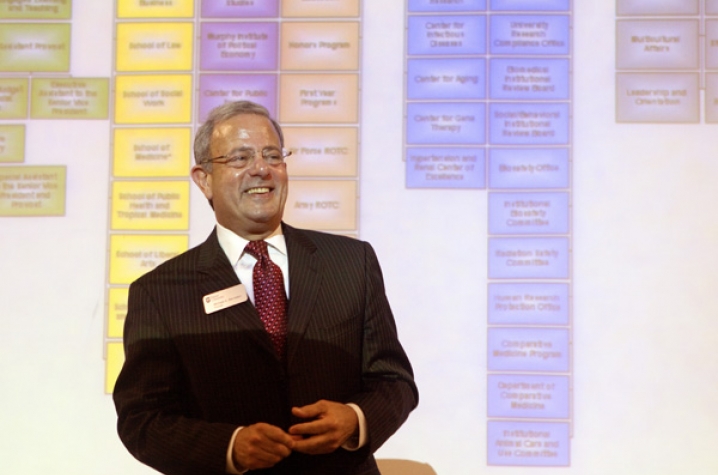Tulane Provost to Speak on how Post-Katrina Community Service Strengthened his University

LEXINGTON, Ky. (Feb. 16, 2012) — Tulane University's provost will visit the University of Kentucky next week to talk about his university's remarkable comeback from Hurricane Katrina, its role in New Orleans' recovery efforts, and how community service initiatives have strengthened both the university and its relationship with the community.
Michael A. Bernstein, Tulane's provost and senior vice president for academic affairs, will present his talk, "Tulane University Since Hurricane Katrina: Crisis and Change in the Wake of Catastrophe," at 7:30 p.m. Monday, Feb. 20, in the auditorium of the UK Marksbury Building. Poet and UK English Professor Nikky Finney will open with a reading from her National-Book-Award-winning collection "Head Off and Split."
The event, which is free and open to the public, is sponsored by UK’s Center for the Enhancement of Learning and Teaching (CELT), with generous co-sponsorship from University Engagement, Community Engagement, Chellgren Center for Undergraduate Excellence, Center for Community Outreach, Student Affairs and Undergraduate Studies.
"Higher education is not simply about delivering skill sets for future employees," Bernstein recently said. "It is also about creating engaged, reliable, trustworthy, and useful citizens. Hurricane Katrina brought that lesson home to us with powerful and indeed poignant force."
When Katrina struck in late August 2005, Tulane had just begun its fall semester. Some 80 percent of New Orleans was underwater, including over 70 percent of Tulane's main campus. Many feared that it would take a year or longer for the university to reopen. Instead, the campus was back up and running for its spring semester, in January 2006.
"We have always taught history at Tulane; now we are going to make it," Tulane President Scott Cowen said, upon the university's reopening.
And the university has made good on that promise. In 2006, stressing its commitment to New Orleans' renewal, Tulane became the first major research university to institute a public-service graduation requirement for undergraduates. Each year, students perform hundreds of thousands of hours of service to help with the city's recovery efforts, under the guidance and supervision of hundreds of Tulane faculty.
Tulane's dedication to community service also appears to be a draw for prospective students. Before Katrina hit, Tulane received around 18,000 applications for 1,500 undergraduate spots. Just five years later, that number had more than doubled, with some 44,000 applicants seeking admission in the fall of 2010, the largest number of applications for any private university in the country.
"It's striking how mutually beneficial this move has been," said Kathi Kern, director of CELT at UK. "It's been good for New Orleans, but it's also been great for Tulane. I hope our event provides an opportunity for faculty, students, and community members to dream big about what we can do here."
At UK, service learning has been integrated into several programs and courses, although there is not a uniform service-based graduation requirement. Kern says that Tulane's approach can serve as both a model and an inspiration.
"At the Center for the Enhancement of Learning and Teaching, we have anchored this year around the theme of reimagining the classroom," Kern said. "The Tulane project takes that theme to a whole new level. I applaud the way Provost Bernstein has challenged the faculty at Tulane to be inventive, to make undergraduate education relevant to real-world concerns, and to embrace the notion that universities are grounded in a place, a city, a state."
MEDIA CONTACT: Keith Hautala, (859) 323-2396; keith.hautala@uky.edu




